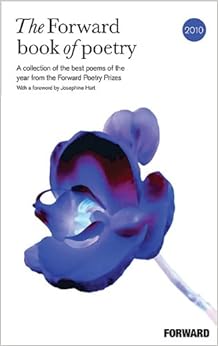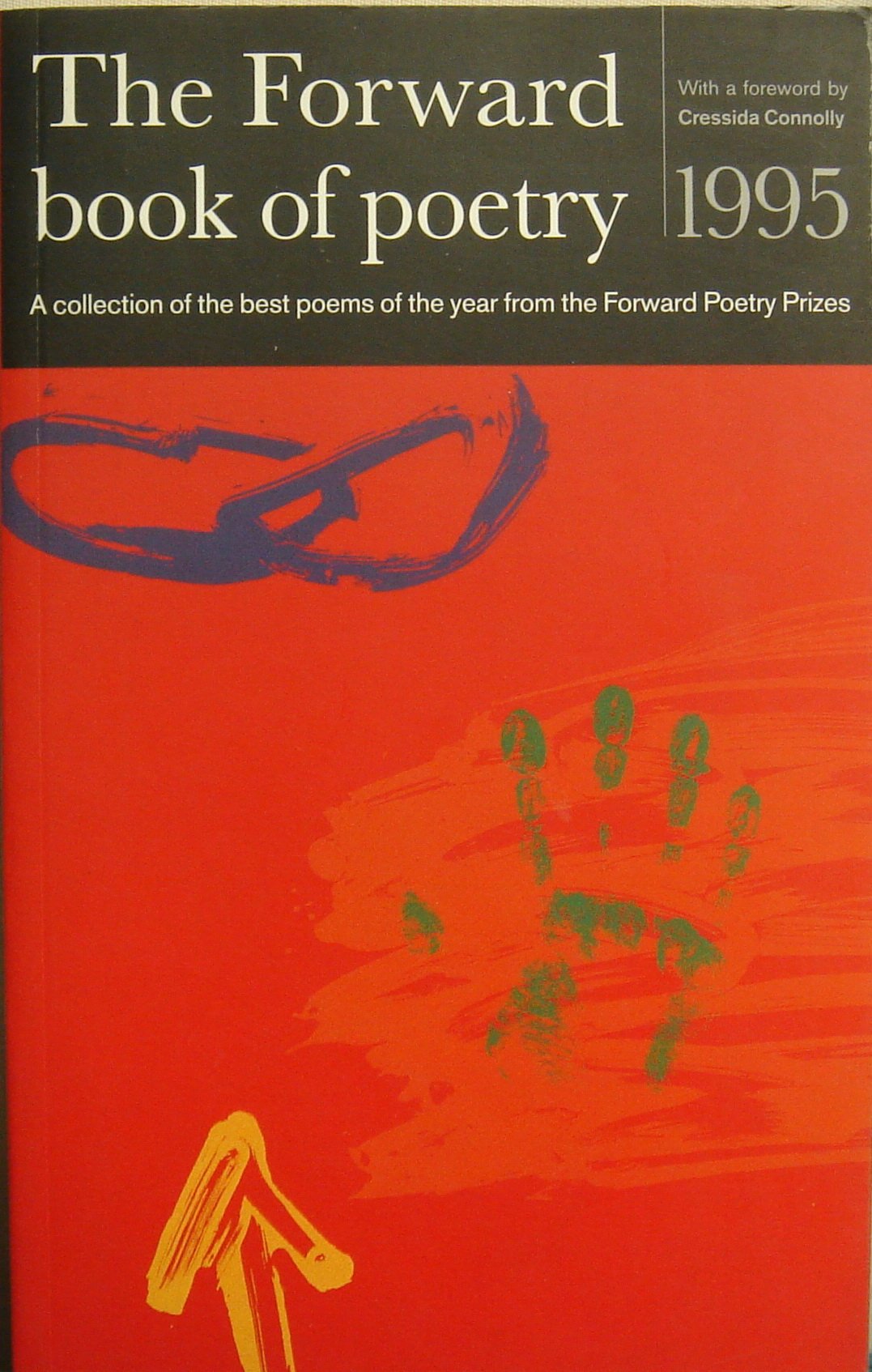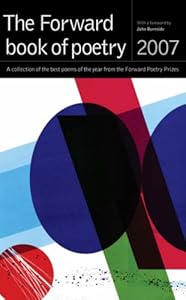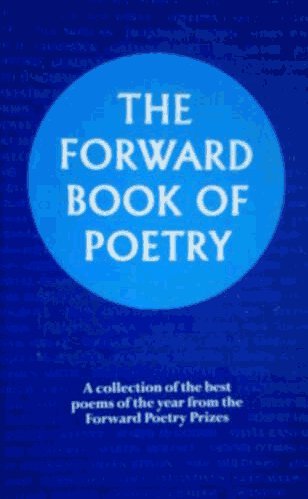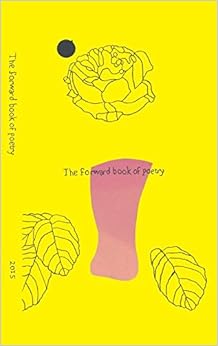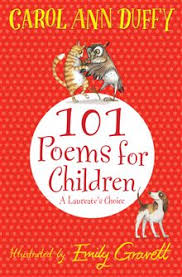The Forward Book of Poetry 2010
London, Forward, 2010
The 2010 collection is larger than any other Forward Book of Poetry - it contains some of the longest poems I have read in all the anthologies. But it also consists of a wide variety of subjects and forms, and every poems has memorable images and lines.
I am starting to see familiar names recurring in the collections I have been reading - the more you read, the more you know. I was delighted to see Hugo Williams in the 2010 collection - his 'Poems to My Mother' are warm and honest, consistent with his work I have read elsewhere.
Family is a theme that repeatedly comes up in poetry, but none more so than in this collection. It was presented in so many forms - from admiration to anger, tragedy to humour. Many seemed to be saying good bye, such as Christopher James' heart-breaking thoughts on his father. The words portray the individual poet's battles with their relationships; in particular, the darkness of Brian Henry's 'Quarantine' still haunts me.
War and terror seemed to frequently be explored - even ten years after 9/11, the images of this tragedy remain on the minds of the writers. Clive James' ability to find a dark sort of humour in this subject demonstrates the zanity with which terrorism is thought.
Alongside these are reflections on opportunities missed and lives not fulfilled. Roger McGough, a writer I normally associate with humour, declares, "We didn't make our beds, but we lie in them." And Kevin Hart muses over what life could have been like had he taken a different path.
Many different styles were on show in this collection - from structure, rhyming poems to those without punctuation and correct grammar. In places, words seemed to be thrown at random upon the page, until closer reading revealed love or hope or longing.
The ones I loved the most, as per usual, were those written by women, typically about relationships. The 2010 collection gave me a great selection to choose from, including Lorraine Mariner and Selima Hill, aforementioned favourites. But this collection iintroduced me to Tamsin Kendrick, whose weighing up of 'Peter Pan vs Captain Hook' forces you to reflect on your ideal man; especially when paired with Katy Evans-Bush's 'To My Next Lover', which immediately made me go away and write.
What more can you ask of a collection of poetry?
The Forward Book of Poetry 1995
London, Forward, 1995
I love the idea of an impromptu poetry reading from Carol Ann Duffy, Jean Binta Breeze and William Sieghart. Apparently, this is what happened during the meeting of the judging panel for the 1995 Forward Prizes.
As Cressida Connely notes in her foreword, this collection consists of such an incredible variety of poetry, though much of it is rather longer than my usual preference. There are poems about music, from Marvin Gaye to Joe Meek; poems about love and family and loss; and even poems about poems.
Peter Sansom's 'Today We Are Shooting Poets' is a funny, clever piece of writing, in contrast to Ann Sansom's celebration of variety in voices.
There are also brilliantly strong women in this collection, possibly a reflection of Carol Ann Duffy's presence on the selection panel. Helen Dunmore's 'Three Ways of Recovering a Body' is simultaneously tragic and uplifting, but packs a punch alongside the words of Jackie Kay and Louise Hudson.
And there are poems in here I want to read again and again, and that I think might lead me to writing my own response; particularly Peter Didsbury's 'A Malediction', which just oozes inspiration in it's structure, form and subject. Time to get writing, I guess...
The Forward Book of Poetry 2007
London, Forward, 2006
2007 appears to have been the year of the incredibly long poem, and yet this collection is surprisingly short. As John Burnside notes in his foreword, the judges of 2007 selected six finalists for each category, instead of the usual five. But the selection of Highly Commended Poems is shorter than usual, and this is where I found the real gems.
This collection covers as wide a range of themes as any of the Forward Arts Foundation books, but there seems to be a heavier leaning towards poems about the labouring classes than usual, from forestry to mining and beyond.
Then, there are brilliant accounts of fantasy like Tim Wells' 'On Being Expelled from Eton for Shagging Tallulah Bankhead', which imagines a world in which a working class boy could go to an establishment school.
Although many of these poems are rather longer than I typically prefer, there are some excellent examples of experimentation with form, including Allan Crosbie's 'Manifesto', the power of which is so difficult to articulate - you will simply have to read it yourself to believe it.
But I think my favourite is 'Bird' by Clare Shaw - somewhat unexpectedly, as I am not the kind of person who likes stories about animals; I have always responded better to human pain and success. But 'Bird' is so beautifully written, so delicate and innocent, that I could not help but love it.
The Forward Book of Poetry
London, Forward, 1993
My new life rule is that I will always take a collection of poetry with me when I go travelling / holidaying.
I was lucky enough to get away over half term and have a copy of the Forward Book of Poetry 1994 in my small bag of luggage. On quiet nights when I couldn't sleep, I escaped to one of the minute stories in these poems.
1994 was the second year of the Forward Prizes for Poetry, and it feels like quite a different selection from the current winners. Some of the issues explored are the same now as then - relationships, family and happiness are universal - but some are specifically contemporary, a reflection of the politics and technologies of the time.
There are some absolute gems in this collection. Carol Ann Duffy was the winner of the best collection, with her sharp, angry wit; and Vicki Feaver's 'Judith' features, a poem I came across last year when dramatically recited by Poetry by Heart competitors.
Then there is Sylvia Kantaris, one of my earliest poetic loves. During my final year in Exeter, I volunteered at the Heritage Collections, and was responsible for box listing a selection of drafts and notes donated by Kantaris. Reading through her early concepts, I think I first understood how poetry is constructed and crafted, so I was delighted to see 'Animals' in this book.
This collection contains lots of brilliant poetry - humourous, political, romantic - but there were several that were assertive and uplifting that I found myself returning to again and again. Like the sonnet by Sophie Hannah, or Sylvia Dann's little unpunctuated masterpiece, both of which felt like the words could have been mine.
Poetry is powerful in that way - words, written by someone else, can speak to you or reassure you, and it makes you feel safe and whole.
The Forward Book of Poetry
London, Forward, 2014, 175p
It has been a pleasure to read this anthology. Over the few years, my understanding and appreciation of poetry has grown, and I have found some real gems in this anthology.
The Forward Prizes for Poetry are given for success in the publication of a collection, a first collection, and for recognised single poems. Kei Miller was celebrated as the winner of the Best Collection last month, and there is no doubt his writing is original and thought-provoking.
I found old loves and new favourites throughout this collection, some of which I cannot stop myself returning to again and again.
For example, 'Rissotto' by Mary Woodward is right at the back of the collection, and I stumbled upon it one evening when impatiently flicking through the pages. It is delicious, tempting and inviting, and made me immediately hungry. Hugo Williams' conversational style of story telling struck a chord with the common fears we all experience in love and life. And Graham Clifford's 'Best Poem Ever Written' reminded me of one of my favourites from last year, Emily Berry's 'International Poem of the Year'.
But more than any other poet, I love the work of Kevin Powers. The collection has a useful biography section at the back, that informed me Powers was an American serviceman in Iraq; but I could identify that from the emotive and dark realism of his poetry. He writes with anger and guilt, and his words brought tears to my eyes. This is a poet from whom I want to read more.
I am currently working with my creative writing students on responses to current and past commended Forward poets, either in the form of poetry, essays or performance. I have found some great sources for inspiration in this collection - some visual, some historical, some literary. There is a great variety of writing, which I think may be partly due to a great selection of judges. Poems from different cultures and forms are celebrated, and no two pages tell the same story.
Click here to read my other blog and follow what is going on with regards to students' responses to the Forward collections.
Wings
An Anthology from the First Story Groups at Oxford Spires Academy
ed. Kate Clanchy
London, First Story, 2014, 86p
I am endlessly impressed by the work carried out by the charity, First Story, and by the writing produced by the young individuals who are fortunate enough to experience their program.
Today, we launched the Oxford Spires Academy anthology, named Wings because of the array of fantastical poetry written around the theme of flying. The book opens with a poem about a young boy's dream of being a super hero, rescuing a school boy from his bullies; followed by an account of a student's childhood dream of building her own set of wings.
But there is so much more than that - poems about childhood memories and school day fantasies; letters to fathers, no longer with us; pleas to future lovers and old friends.
The anthology is artistically put together by Kate Clanchy, our amazing Writer-in-Residence, who has created rhythm and flow to the book as a whole. Throughout the collection, some styles recur, demonstrating the impact of Kate's workshops upon the students' writing. But this year's book is incredibly diverse, including poetry, prose and plays, writing about Oxford, Bangladesh and Nepal, poems about students' dreams and some that are completely fictional.
The poems are mature, emotional and sensitive, exploring what it means to be a young person today.
Tonight, we welcomed esteemed guests from Oxford Spires and First Story to experience the words spoken from the students' mouths. They were absolutely breathtaking - I am so incredibly proud of all they have achieved in a short space of time.
What Are We Fighting For?
Brian Moses and Roger Stevens
London, Macmillan, 2014, 112p
Seeing as this year marks the centenary of The Great War, I am anticipating many publications to deal with this subject. What Are We Fighting For is the first I have come across: a varied, original collection of poems written and collated by Brian Moses and Roger Stevens.
At first, I thought this collection would be an anthology of existing poems, and was disappointed to find that it was in fact some new poems written by contemporary poets. I felt a little concerned that they had no authority on the subject and that the writing would be idealised or exaggerated.
But I was pleasantly surprised to find poetry that covered a variety of subjects in a factual and informative way. The collection felt a little like a history book, giving information about life in the trenches, the causes of conflict, and what things were like for those people left at home. Some of the poems are supported with snippets of factual information, explaining what realities the stories relate to. And each poem is just that - a little story about a person or a place or an event, taken from history and embelleshed in a more accessible manner.
This book contains poems about all conflict - from the First and Second World War, right through to modern day conflicts. The final section seems more childlike and innocent, exploring the world through the eyes of young characters who do not see war in their back garden, but are sometimes vaguely aware of world news and battles fought overseas. There is even a poem about a playground fight, as Moses and Stevens cast doubt on conflict at all levels.
So despite not meeting my initial expectations, I found this collection of new poems to be touching, leaving the reader with food for thought; though I expect there to be a lot more high quality writing on this subject to be revealed over the next few years.
101 Poems for Children: A Laureate's Choice
ed. Carol Ann Duffy
ill. Emily Gravett
London, Macmillan, 2013, 193p
It is a valuable skill for a poet to be able to create a succinct and engaging anthology of poetry. With so much choice, the editor must be very well read and able to create a flow through the various works of multiple artists, bringing them together in one book.
This is precisely what Carol Ann Duffy has achieved in 101 Poems for Children. The poetry comes from many authors over lots of countries across many centuries and yet it flows brilliantly. Each poem leads into the next one, without any breaks or bumps along the way.
And the selection is very entertaining, exploring tales about animals, families, seasons and journeys. There are some with rhyme and some without; some are short and some are long; but all are exceptional demonstrations of language and writing.
One of my favourites, which I had not read before, is one of Carol Ann Duffy's own: F for Fox, a lovely piece that uses the letter 'f' more times than I imagined possible in one poem! As she discusses in her introduction to the collection, children's poetry is often characterised by the rhythm and simple use of language. Recurring tropes include alliteration and simile, and writers use the full extent of poetic license to make up new words.
I've been dipping in and out of this collection over the last couple of weeks, and was sad when it came to an end; and not least because the last poem in the collection is about the wonder of libraries!!
The Forward Book of Poetry 2014
Fd. Jeanette Winterson
London, Forward, 2013, 144p
There are so many themes covered in an anthology of this size and quality that every time you open it you find something new - a new form, style or subject.
The Forward Poetry competition celebrates new poetry published each year, producing this incredible collection. Within this book, you have finalists from a number of categories and I enjoyed the variety that afforded.
In terms of some specifics, there were some individual poems that made this anthology something special for me. I am only human, and therefore cannot claim to love every poem I read.
One, called 'The International Poem of the Year' by Emily Berry, described a strange dystopia in which poems are political weapons. Nations banned them, fought over them, and launched them into space. Elsewhere, poems played a "role in pioneering eye operations, contribut[ing] to democracies and charitable works". This poem was excatly what Winterson discusses in her foreward when she describes poems as bombs, giving "us back the words we need so that we can say how we feel".
I was also impressed by the presence of two poems about Sheffield in this collection: 'In Sheffield' by Adam White and Stainless Stephen by Helen Mort. In praise of Sheffield, these poems explored the steel industry through two very different routes, with Mort personifying the industry and White engaging with the history of the city. It felt like home to read these.
Another I wanted to comment upon was Michael Symmons Robert and the two poems from him that are a brilliant addition to this collection. He has an incredible way with words, looking at universal themes of family and love with language that reaches right into your heart and plucks at your deepest dreams and fears.
Poetry is at the forefront of my life at the moment, as we celebrate the wonderful students who have won international competitions. I have high hopes for the young writers at Oxford Spires Academy, who's names will one day fill the pages of anthologies such as this.
Candle Lights, Snow Fights and Star Lights
An Anthology from the First Story / Arvon Week at The Hurst
Ed. Peter Hobbs
London, First Story, 2013, 55p
Wow.
That is really all I need to say. But I don't think I'm going to get away with that.
If you are reading this blog and you haven't heard of First Story, where have you been?!? Last February, I was lucky enough to be put on a train and sent to Shropshire for an Arvon creative writing course. Stranded in the middle of a forest in a foot of snowfall with no signal and no escape, fifteen talented young writers shared laughter, experiences and poetry.
We were blessed with Salena Godden and Peter Hobbs as our guides, who braved cold winter nights and long fraught workshops to produce the most inspired and inspirational writing I have ever witnessed.
This was one of my earliest encounters with First Story. I had nothing to hide behind, forced to write and read out, even though my rough scribbles paled in comparison to what came out of the pens of the teenagers present. These young people lit up the rooms with their imaginations, bringing to life unicorns, Buddhist monks and Marilyn Monroe.
This anthology is a culmination of that week's work. With contributions from all the students from the three schools, it is just a taste of what myself and the other adults present got to enjoy. Those hesitant early drafts have turned into masterpieces of poetry and prose, some merry, some melancholy, some macabre, all marvellous.
Room
An Anthology by the First Story Groups at Oxford Spires Academy
Ed. Kate Clanchy
London, First Story, 2013, 65p
Today, we are launching the fourth anthology of student writing from Oxford Spires Academy, in collaboration with First Story. I am thrilled by this publication, because I have been honoured to be involved in the organisation of this event, alongside with my beautiful friend and wonderful colleague, Emma Bate.
Room is an incredible anthology, full of variety and inspiration; from the fully formed creations of our older and more confident students, to the fledgling ideas of our younger contributors. It has been inspired and moulded by our writer-in-residence, Kate Clanchy, who has offered support and guidance to the students. Room has given these young writers the chance to express themselves: as Kate says in her Introduction, there is room for them all in this little book.
This year, some of the First Story meetings have taken place in the Library, giving me the opportunity to get to know the student writers. As you might expect from a group of literary students, they are mostly quiet and reserved - that is until they put pen to paper, and suddenly they are screaming and shouting through the page. These young people are a diverse and talented group, full of ideas and feelings, anger and hope. They write about what they know, and also what they dream. Some write about politics or religion, others about relationships and family; all have something to say.
It is a privileged that we can celebrate the talent of these students through the publication of this anthology - these young writers are destined for greatness.
The Details
Judged by Bernard O'Donoghue, Carrie Etter, and Peter McDonald
Oxford, Tower Poetry, 2013
Yesterday, Azfa Ali won the first prize in the Christopher Tower Poetry Competition of 2013. She is an Oxford Spires Academy student, a First Story apprentice, and a talented young lady.
The Tower Poetry Prize, in it's thirteenth year, attracted over six hundred entries this year, which were whittled down by three brave judges to just six. The competition is designed to inspire creative writing and reading in young people, and has produced some incredible poets in the past.
In a small room at Christ Church College in Oxford, the six prizewinners gathered with Oxford academics, relatives of Christopher Tower, and their friends and families. The theme was "The Details" and the resulting work was beautiful. Azfa won with her poem, Origins, which includes one of my favourite of her passages, describing the journey of a refugee on a motorway.
Second and third place went to Sarah Fletcher and Erin Tunney respectively. Both are incredible in their ability to embody the spirit of characters they have no experience of. Miss Fletcher writes from the viewpoint of a young Dutch girl and her relationship with a German officer during World War One - a beautiful and evocative piece of writing. Also commended for their poetry were Kathryn Cussons, Luke van den Barselaar, and Eva Wallace. As the only male shorlisted, van den Barselaar should be credited for writing an incredible poem, Research, which conflicts the love and adoration of a woman's body with a voice that is dark and sinister.
I am incredibly proud of Azfa - she is a deserving winner amongst such difficult competition.
Journeys
An Anthology by the First Story Group at Oxford Spires Academy
ed. Kate Clanchy
London, First Story, 2012, p64
In getting to know the students at my school, I found this little anthology invaluable. Sometimes it is really challenging to understand what goes on inside the mind of a teenage girl or boy, but reading their words opens up their world like you couldn't imagine.
These poems focus more around loss. The school population suffered from some terrible losses during the last academic year, and writing was a medicine that appears to have helped this small group. This anthology is much darker than Differentiation, as more tragic themes dominate; but the words are just as beautiful and incredibly meaningful.
Again, congratulations to Kate Clanchy for wonderful editorial work. She makes the anthology flow perfectly, so that the collection ends with a hint of hope in this world of melancholy.
But the most delightful thing is the talent of these young people. There is so much feeling and emotion in such a short collection. Their experiences are unimaginable for a group so young, but they are so strong and brave. They are completely inspiring.
Differentiation
An Anthology by the First Story Group at Oxford Spires Academy
ed. Kate Clanchy
London, First Story Ltd, 2011, 58p
This is an anthology of work by some of the students at the school I work at. I have never been prouder of them than when reading this short collection of poems.
Differentiation is about the experiences of these wonderful students. Love. Loss. Life. Death. They are emotive, intelligent and inspiring. I found myself becoming incredibly emotional over every single poem, for numerous reasons.
Some of these girls and boys have experienced incredible hardship. I already know the stories of some - those who have moved to England from Brazil, Pakistan, China. Others who have lost loved ones, or who have an unsettled home life. Life has not been easy on some of these students. It breaks my heart to read of the abuse and neglect they have suffered. And these are not words I use lightly.
And yet, despite the highly personal nature of these experiences, the words and rhymes created by these young people help the reader see the same things, feel the same feelings, and truly understand. There are words and phrases in there that we have all felt at some point.
Kate Clanchy did an incredible job of editing the anthology - the poems are ordered perfectly, so they easily flow from one to the other. You can also see the influence of the First Story group over the poems. Kate plans the sessions so the students all write in a similar style or with the same title for the first few weeks, building their confidence until they can come up with their own inspiration. Thus, some of these poems have similar themes, but this adds to the flow of the anthology.
For me, the best way to understand poetry is to know the poet. My favourite poems are not fantasy stories, or descriptions of people and places, but accounts of experiences and feelings. And in knowing where these words have come from, and in knowing who wrote them ... that is where the value lies in poetry.
The Oxford Treasury of Classic Poems
ed. Michael Harrison and Christopher Stuart-Clark
Oxford: Oxford University Press, 2011, 158p
It's National Poetry Day, but I feel I have failed in my role as a librarian. I have not had enough time or energy to organise any events. I have even failed to make an adequate display, although I do have a table full of poetry books as recommended reading for the students.
I have, however, been working hard to prepare a permanent display of the work of the students at my school. We have a First Story club, and many of the students are aspiring novelists and poets. Alongside the students work, I want to display some classics of poetry, as inspiration and comparison. Therefore, I have been reading, amongst other anthologies, The Oxford Treasury of Classic Poems.
It's a beautiful book with an incredibly diverse collection, from Rossetti to Betjeman. It's targeted at children ages from 9-12, but I think it could appeal to all ages. It definitely had some of my favourites included, like William Blake's London and Jabberwocky by Lewis Carroll. There are also modest illustrations, almost sketch-like drawings throughout the book.
There doesn't appear to be any specific order to the poems - they are not chronological, alphabetical or thematic. But I feel like they have included every classic poem I can think of, both old and new.
This anthology is a great resource for my display, and a lovely book for young and old to enjoy.
